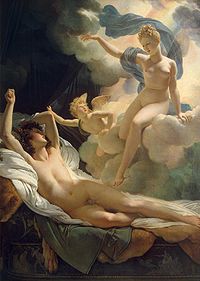- Morpheus (mythology)
-
For other uses, see Morpheus (disambiguation).
Morpheus 
Morpheus and Iris, by Pierre-Narcisse Guérin, 1811God of Dreams Symbol Poppy Parents Nyx (Hesiod), Nyx and Erebus (Cicero), Hypnos (Ovid) Siblings Phantasos, Phobetor, Moros, Hypnos, Thanatos, the Keres, the Moirai, the Hesperides, Momos, Oizys, Apate, Nemesis, Geras, Eris (Hesiod), Charon (Hyginus) Roman equivalent the Somnia Morpheus (
 /ˈmɔrfiəs/ or /ˈmɔrfjuːs/; Greek: Μορφεύς, Morpheus, or Μορφέας, Morpheas, "shaper [of dreams]") in Greek mythology is the god of dreams,[1] leader of the Oneiroi.[2] Morpheus has the ability to take any human form and appear in dreams. His true semblance is that of a winged daemon, imagery shared with many of his siblings.
/ˈmɔrfiəs/ or /ˈmɔrfjuːs/; Greek: Μορφεύς, Morpheus, or Μορφέας, Morpheas, "shaper [of dreams]") in Greek mythology is the god of dreams,[1] leader of the Oneiroi.[2] Morpheus has the ability to take any human form and appear in dreams. His true semblance is that of a winged daemon, imagery shared with many of his siblings.Contents
Family
According to Hesiod,[3] Morpheus is the son of Nyx, the primordial goddess of the Night, produced parthenogenically, or as Cicero claims,[4] with Erebus, the embodiment of Darkness.
Morpheus is the oldest of triplets known as the Oneiroi, along with Icelus and Phantasos. For this reason, he is also referred to as Oneiros. The Oneiroi are attendants of Hypnos, the god of Sleep, bringing dreams to the mortals and gods who fall under the power of Sleep. Morpheus sees Hypnos as a father figure as Hypnos takes care of the other siblings.
The Roman poet Ovid, however, states in his Metamorphoses[5] that Morpheus is a son of Hypnos, rather than his brother (it does not mention the identity of the mother), and multiplies the Oneiroi into an uncountable host of spirits, with Morpheus, Icelus and Phantasos being merely the most prominent among them. Morpheus was the leader of the Oneiroi, the gods or spirits (daimones) of dreams. He manifested himself in the dreams of kings and rulers in the likeness of men as a messenger of the gods.
Morpheus was probably equated with the Dream-Spirit which Zeus sent to visit Agamemnon in the Iliad (see Oneiroi).
The land of dreams (Demos Oneiroi) was located somewhere in the underworld, presumably near the domain of Night and her children. Poets often referred to the two gates leading from the dream realm. One gate was fashioned of sawn ivory, the other of polished horn. False dreams were said to pass through the gate of ivory, while truthful, prophetic dreams winged their way out through the gate of horn. There was also said to be a wilted elm tree in Morpheus' domain, upon which the dreams fashioned by the Oneiroi hung, with the appearance of winged phantom-shapes.
Appearances
- The drug morphine is named after him.
- Morpheus is spoken of in the Metamorphoses of Ovid. According to Ovid, Morpheus concentrated on the human elements of dreams, his brothers Phobetor and Phantasos being responsible for animals and inanimate objects, respectively.
- It is also believed that in the Iliad he is spoken of as "Oneiros".
- He is referred to in Edmund Spenser's The Faerie Queene (1590). He sleeps on an ebony bed in a dimly lit cave, surrounded by poppy flowers.
- Morpheus, under the name of Dream, is the principal character in Neil Gaiman's comic book series, The Sandman. As the embodiment and ruler of dreams, he uses many different names, two of which are Morpheus and Oneiros. In the Sandman series Morpheus is also the father of Orpheus, the famed musician of Greek mythology.
- Morpheus is featured in episode 3, season 1 of Xena Warrior Princess, where he is the object of worship of a corrupted dream cult. He is also in Homer's Adventures of Odysseus/Ulysses.
- Morpheus as a reference to Morphine is used in a song by the American rock band "Hurt" in a song off their "Vol. I" album called "Overdose"
- Morpheus brings the night sky to the fields of Mt. Olympus in the Pastoral Symphony segment of Disney's Fantasia (film)
- Morpheus is also referred to in "Comatose (In the Arms of Slumber)" from the album "Desireless" by Eagle Eye Cherry.
- Morpheus makes an appearance in "The Last Olympian" by Rick Riordan – the fifth book of his "Percy Jackson and the Olympians" series - as the god of dreams. He puts all of New York City to sleep.
- Morpheus "appears" (only his shadows) in God Of War: Chains of Olympus
- Morpheus is mentioned in the song "The Safest Way Into Tomorrow" by Trans-Siberian Orchestra. Reference is also made to his wings which he is "offering" in the song (to the person being addressed).
- In the film The Matrix (1999), Morpheus (interpreted by Laurence Fishburne) is the leader of a team of free humans and enables Neo to wake up from his "sleep".
- Little Nemo in Slumberland, a comic about a boy's surreal dreams, includes a supporting character named "King Morpheus."
Notes
- ^ Smith, "Morpheus"
- ^ "TheoiProject: Morpheus". Theoi.com. http://www.theoi.com/Daimon/OneirosMorpheus.html. Retrieved 2011-01-21.
- ^ Hesiod Theogony, 212
- ^ Cicero De Natura Deorum 3.17.
- ^ Ovid, Metamorphoses xi.585ff.
Vicomte de Bragelonne by Alexandre Dumas. "Chamber of Morpheus" at "Chateau de Vaux-Le-Vicomte"
References
- Ovid, Metamorphoses, Book XI, at Google Books
- John Potter, "Archaeologia Graeca, or The antiquities of Greece. To which is added, an appendix, containing a concise history of the Grecian states", 1818, Chapter XIII - Of Divination by Dreams, at Google Books
- Smith, William; Dictionary of Greek and Roman Biography and Mythology, London (1873). "Morpheus"
Categories:- Greek mythology
- Greek gods
- Dreaming
Wikimedia Foundation. 2010.
